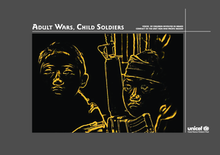Globally, it is estimated that, at any one time, around 300,000 children under the age of 18 are currently serving as child soldiers. Up to one fourth of these children can be found in the East Asia and Pacific region, and many more have served as soldiers in countries no longer facing armed conflict. As children grow older, the destruction is perpetuated, and the promise and potential of each new generation is lost. This report is an effort to draw attention to the reality of child soldiers in this region, to demonstrate the need for our urgent response.
In these pages, current and former child soldiers express their ideas, thoughts, feelings and fears. It is a record of their voices, rather than a search for numbers. With this report, UNICEF seeks to raise awareness and shed light on the specific nature of child soldiering in the East Asia and Pacific region. By placing the issue on the agenda, the report will ultimately identify ways to reduce and end the involvement of children in these conflicts. Above all, it attempts to let the child soldiers "talk" to decision makers, child rights advocates, the media, youth leaders, military personnel and the general public.
As a qualitative evaluation of the problem of child soldiering in the East Asia and Pacific region, this study will also serve as a valuable resource for policy and programme planning by governments, inter-government and non-government organizations, as well as civil society. By documenting the experiences of children abducted or recruited by armed forces and groups, it provides powerful evidence that children should never be forced or, under any circumstance, permitted to trade their childhood for a uniform and a gun.
This study specifically addresses the following key questions:
- What is the family background of the children involved with armed groups?
- How did they become child soldiers?
- What did they experience as child soldiers?
- What do they experience as a consequence?
- What are their views and thoughts about the future?
©UNICEF

